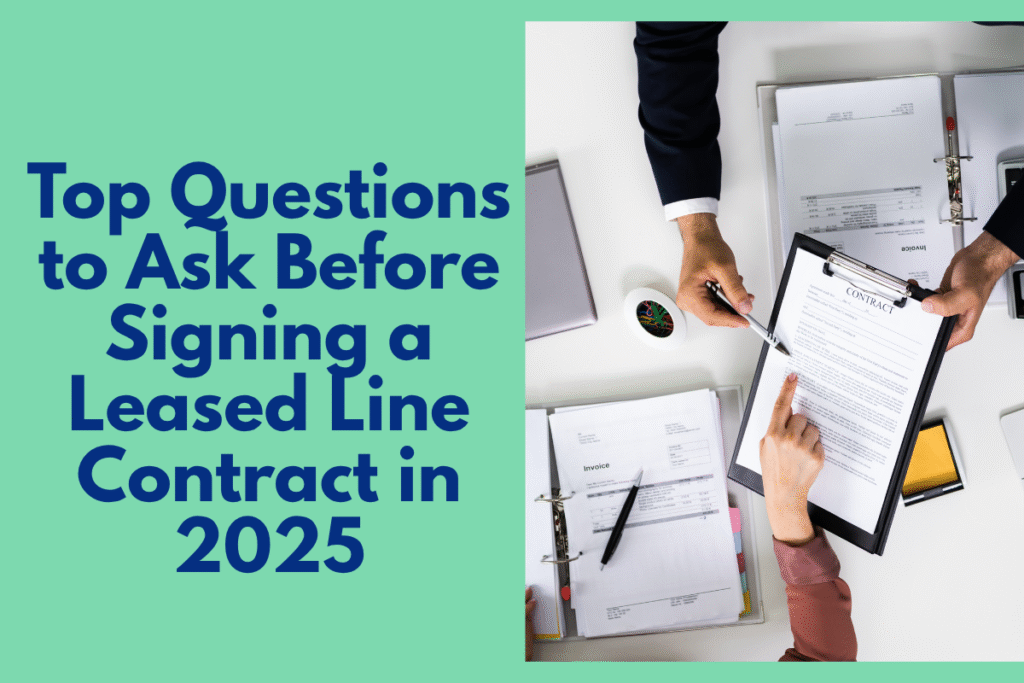Choosing a leased line is a big decision, and if you choose right, you can give your business some serious advantages. But before putting pen to paper, it’s essential to know exactly what you’re getting …and what you’re not!
In our handy guide, we’ll share the top questions every UK business should ask before signing a leased line contract in 2025, plus expert tips on negotiating terms, avoiding hidden fees, and comparing providers.

💡 Why It Matters
Leased line contracts typically range from 12 to 36 months, so signing a long-term deal without doing your homework can lock you into overpriced services, slow response times, or unscalable infrastructure.
By asking the right questions upfront, you gain transparency, cost control, and confidence in your connectivity decision.
🔟 Questions to Ask Before You Sign
1. What is the Contention Ratio? (hint: it should be 1:1)
A true leased line should be uncontended… meaning you don’t share bandwidth with anyone else. Always clarify this to avoid confusing it with FTTP or shared business broadband.
2. What SLA comes with this line?
Check:
- Uptime guarantee (e.g. 99.99%)
- Fix times (e.g. 4–6 hours)
- Compensation for outages
- 24/7 monitoring and support
🛡️ remember that a robust SLA is your safety net if something goes wrong.
3. How scalable is the line if we need to upgrade speed later?
Make sure your provider allows you to upgrade your speed (e.g. from 100Mbps to 1Gbps) without a full recontract or massive fees – remember that flexibility matters for growing businesses.
4. Is the quoted price all-inclusive?
Ask if the monthly cost includes:
- Router rental or installation
- SLA and support
- IP addresses
- Connection delivery/installation
🚫 Beware of “bait-and-switch” pricing that excludes these essentials.
5. What is the lead time for installation?
Typical UK lead times range from 20 to 90 working days, depending on location and infrastructure. Ask:
- Will there be a site survey?
- Any wayleaves or delays expected?
- Are temporary solutions offered in the meantime?
6. What happens if the line goes down?
Do they offer:
- 4G/5G failover?
- Backup FTTP/FTTC line?
- SD-WAN routing or dual-fibre setup?
💡 Consider building business continuity into your connectivity.
7. Can you offer static IP addresses?
Most businesses need one or more static IPs for:
- VPN access
- Hosting internal servers
- Secure remote working
✅ you should also ask how many are included and whether more are available if needed.
8. Do you own the infrastructure or resell another network?
Some providers (like BT or Virgin Media) own infrastructure; others (like resellers) depend on third-party networks. While resellers may be cheaper, direct networks offer better SLAs and control.
9. What support do you offer post-installation?
Ask about:
- Support availability (24/7 or business hours?)
- UK-based tech teams?
- Access to a dedicated account manager?
🔧 Great support makes a big difference when issues arise.
10. What are the contract length options and exit terms?
Find out:
- Can you choose 12, 24 or 36-month terms?
- Are there penalties for early termination?
- Is there a trial or cooling-off period?
📝 Flexibility and transparency protect your business.
📊 UK Leased Line Providers
| Provider | Redundancy options | Dual carrier Support? | From |
| Diverse routing, dual links | Yes | £399 + redundancy |
| Dual-site connectivity | Yes | £400 + |
| Separate routes, SD-WAN | Yes | £450 + |
| Active-passive options | Limited | £300 + |
| Multi-site and resilient WAN | Yes | £375 + |
⚖️ 12 vs 36-Month Contracts: Pros & Cons
Term Length | Pros | Cons |
12-Month | Flexibility, easier exit | Higher monthly cost |
36-Month | Lower monthly rate, incentives | Locked in, early exit fees |
💬 Always ask if your provider offers discounts for longer terms and confirm upgrade clauses if your business grows
🛠️ Bonus: Contract Negotiation Tips
- Get multiple quotes to compare properly
- Ask for free setup or router rental as a deal sweetener
- Negotiate on SLA fix times if you’re in a critical industry
- Use price-match guarantees where offered
- Request written confirmation of all included features
Our Final Thoughts
We think that a leased line is one of the most important investments a business can make, but only if it’s the right one.
By asking the above questions before signing your leased line contract, we know that you’ll protect your budget, boost your performance, and ensure your provider can keep up as your business grows.







